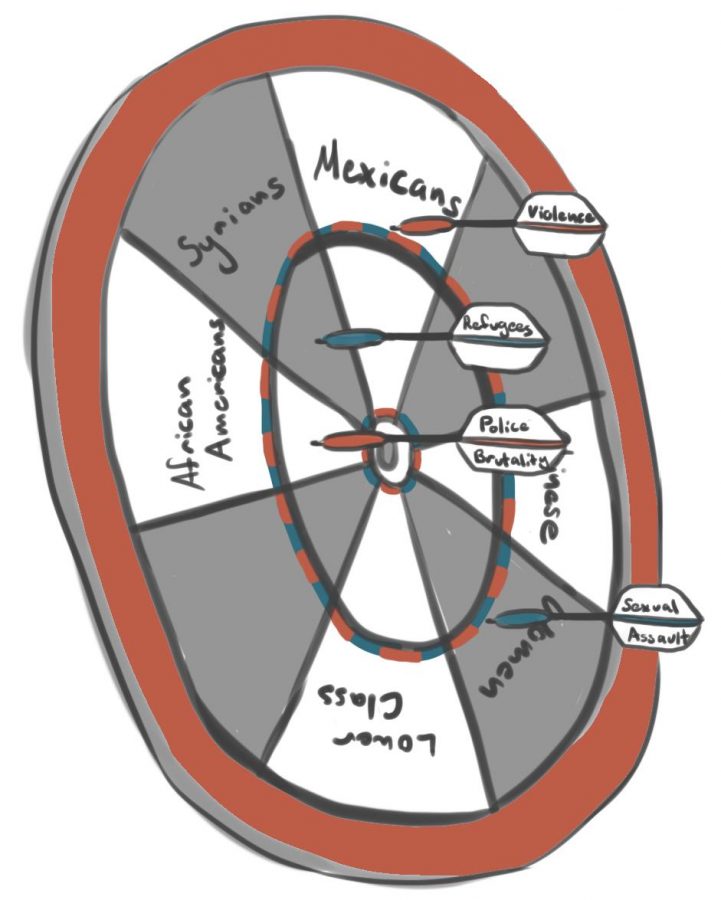If there’s one thing 2015 has taught us how to do, it’s point fingers at each other.
It’s not very polite — or productive. Our national resolution for 2016 should be to drop that nasty habit, take a good hard look at ourselves and protest the norms and attitudes at fault.
Cultural acceptance on social issues such as the legalization of gay marriage and Caitlyn Jenner receiving huge support for her transgender identity transformation helped define 2015. On the other hand, the political tone has shifted into a dangerous, fearful landscape for victims of war, discrimination and violence. The popularity of Donald Trump’s nativism is the most obvious product of the hysteria.
While all of the issues are difficult and complex problems to address, it is important to confront these topics with compassion and nuance. It’s too easy to forget about the individual impacts of the events filling headlines.
The contentious practice of blaming victims — immigrants, refugees, Muslims, people with mental illnesses, criminals and people of color — for the problems this nation faces will not move us forward in solving them. Furthermore, they do not put the blame on the victims, politicians simply shift the blame onto the opposing political party.
We refuse to take accountability for our own actions, or lack thereof. We see the same conflict of fact and reaction throughout the news cycle.
Many military experts and politicians like Bernie Sanders and Rand Paul have agreed that the U.S. intervention in Iraq was partially responsible for the rise of ISIS. Nonetheless, Muslims and refugees continue to be the scapegoats for the nation’s security threats.
Similarly, FBI research has shown that mass shootings increase annually with mostly legally obtained firearms, yet polls demonstrate that criminals and those with severe mental illnesses are blamed for gun violence.
The Black Lives Matters movement has created tension between law enforcement and African-American communities. American citizens have yet to hold the criminal justice system accountable for the racial disparities in imprisonment and unarmed deaths, with no attempt at reform.
According to Pew Research Center, illegal immigration has also declined significantly from Mexico and stabilized over the past few years, yet undocumented immigrants still face endless attacks for supposedly taking American jobs. Meanwhile, the long and inefficient legal process for immigration remains unsolved.
It is wrong to say that any of these groups of people are single-handedly at fault for any multi-faceted, complicated societal issues we face today.
Why is it that whenever the United States faces a deep challenge, the nation refuses to look at the bigger picture and gravitates toward alienating certain groups?
As American citizens, we adopt aggressive individualism and a capitalist mentality at an early age, hearing that with hard work and opportunity, anyone can succeed. The American Dream lies at the heart of what we aspire to be as a country. When someone falls short and does not meet society’s expectations, it implies that it must be their own fault or failure.
When society fails to meet the needs of its citizens, we struggle to admit that the very system we grew up believing in may be flawed. It is much easier to point the finger and blame the “others” for the societal shortcomings many of us have avoided because we were born into a more privileged lifestyle
This ideology keeps us from dealing with issues firsthand and admitting that we need political and cultural changes in the country. We should challenge the laws, policies, attitudes, goals and institutions of power that we currently have, rather than the people they affect.
By attempting to understand the plight of fellow humans by volunteering, donating to important causes, and spreading awareness, we can combat the current partisanship. If we continue to divide people and blame each other for what has come about, we will never move forward. We need understanding and empathy.
The more we take ownership over the current state of our country, the quicker we can look for ways to improve it. The new year is the chance to prove that.



